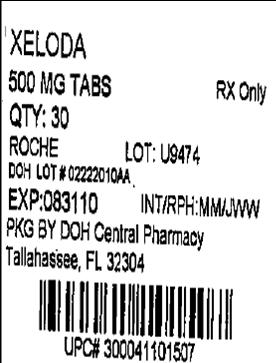Xeloda | Capecitabine Tablet while Breastfeeding

What is Xeloda | Capecitabine Tablet used for?
I am breastfeeding mother and I am using Xeloda | Capecitabine Tablet. Can it have any bad effect on my kid? Shall I search for better alternative?

Nursing Women Lactating mice given a single oral dose of capecitabine excreted significant amounts of capecitabine metabolites into the milk. Because of the potential for serious adverse reactions in nursing infants from capecitabine, it is recommended that nursing be discontinued when receiving XELODA therapy.
Xeloda | Capecitabine Tablet Breastfeeding Analsys
Capecitabine while Breastfeeding
DangerousCAS Number: 154361-50-9
Drug is cleared from the body in 25 elimination half-lives. Resuming breastfeeding is possible after 24 hours of pumping-and-dumping.
Xeloda | Capecitabine Tablet Breastfeeding Analsys - 2
Capecitabine while Breastfeeding
CAS Number: 154361-50-9
Most sources consider breastfeeding to be contraindicated during maternal antineoplastic drug therapy. It might be possible to breastfeed safely during intermittent therapy with an appropriate period of breastfeeding abstinence; the manufacturer recommends an abstinence period of 2 weeks. Capecitabine is metabolized to fluorouracil. Limited information indicates that a maternal continuous intravenous fluorouracil infusion at a dose of 200 mg/square meter daily produces undetectable levels in milk. If capecitabine use is undertaken, monitoring of the infant's complete blood count and differential is advisable. Chemotherapy may adversely affect the normal microbiome and chemical makeup of breastmilk.[1] Women who receive chemotherapy during pregnancy are more likely to have difficulty nursing their infant.[2]
I already used Xeloda | Capecitabine Tablet and meanwhile I breastfed my baby should I be concerned?
You should immediately inform your health care provider about Xeloda | Capecitabine Tablet usage and your breastfeeding interval after usage of
I am nursing mother and my doctor has suggested me to use Xeloda | Capecitabine Tablet, is it safe?
Please double check with your doctor if he is aware of your breastfeeding stratus, Ask your doctor if there is any safe alternative of Xeloda | Capecitabine Tablet. Check with your doctor if you shall temporally stop breastfeeding. You may go for second opinion as well. Still after all of this if your doctor still recommends Xeloda | Capecitabine Tablet then go for it as they have access on more detailed medical and scientific information and they understand your individual medical situation much better.
If I am using Xeloda | Capecitabine Tablet, will my baby need extra monitoring?
Extreme level of monitoring required as Xeloda | Capecitabine Tablet could be dangerous for kid.
Who can I talk to if I have questions about usage of Xeloda | Capecitabine Tablet in breastfeeding?
US
National Womens Health and Breastfeeding Helpline: 800-994-9662 (TDD 888-220-5446) 9 a.m. and 6 p.m. ET, Monday through Friday
UK
National Breastfeeding Helpline: 0300-100-0212 9.30am to 9.30pm, daily
Association of Breastfeeding Mothers: 0300-330-5453
La Leche League: 0345-120-2918
The Breastfeeding Network supporter line in Bengali and Sylheti: 0300-456-2421
National Childbirth Trust (NCT): 0300-330-0700
Australia
National Breastfeeding Helpline: 1800-686-268 24 hours a day, 7 days a week
Canada
Telehealth Ontario for breastfeeding: 1-866-797-0000 24 hours a day, 7 days a week
